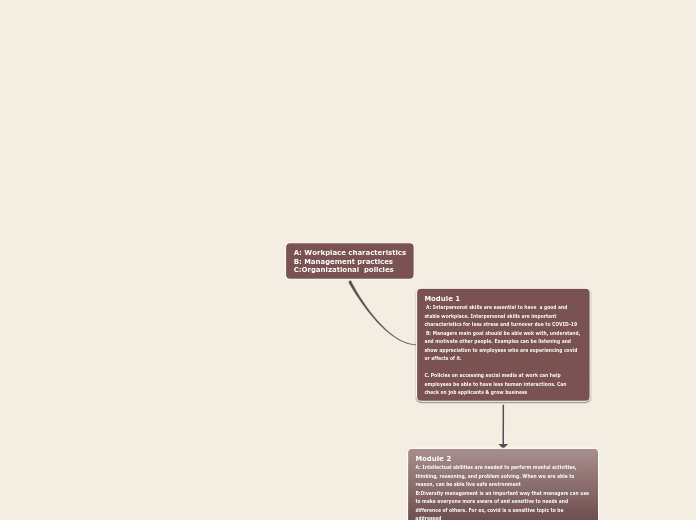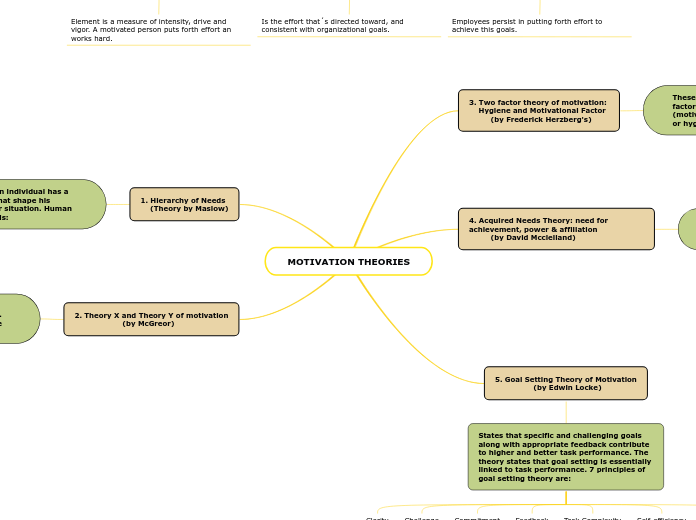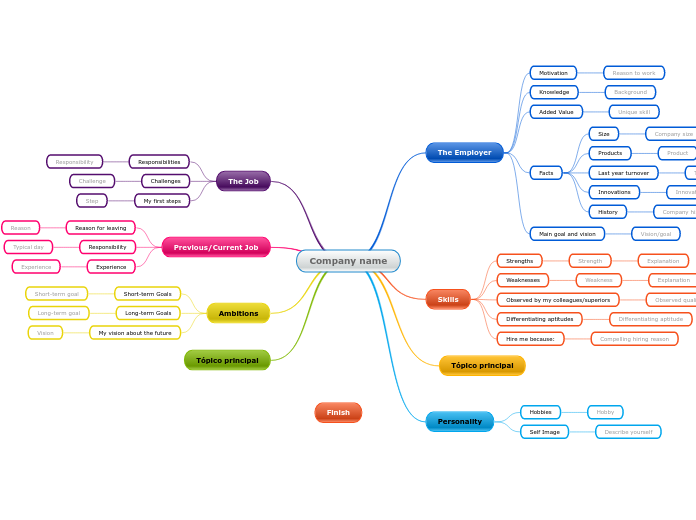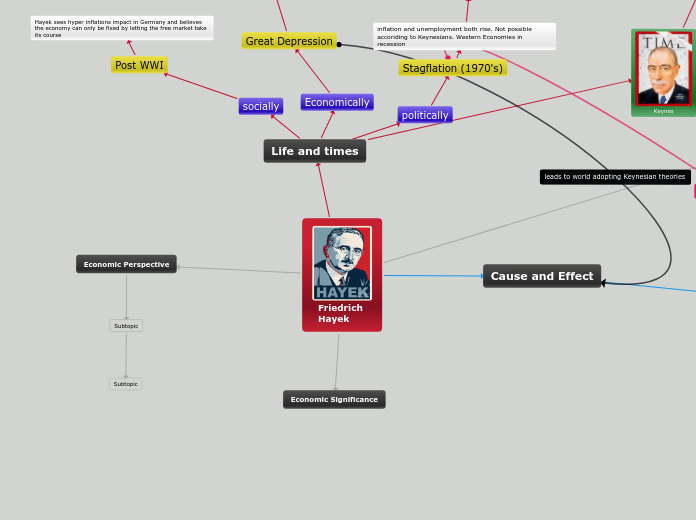A: Workplace characteristics
B: Management practices
C:Organizational policies
Module 1
A: Interpersonal skills are essential to have a good and stable workplace. Interpersonal skills are important characteristics for less stress and turnover due to COVID-19
B: Managers main goal should be able wok with, understand, and motivate other people. Examples can be listening and show appreciation to employees who are experiencing covid or effects of it.
C. Policies on accessing social media at work can help employees be able to have less human interactions. Can check on job applicants & grow business
Module 2
A: Intellectual abilities are needed to perform mental activities, thinking, reasoning, and problem solving. When we are able to reason, can be able live safe environment
B:Diversity management is an important way that managers can use to make everyone more aware of and sensitive to needs and difference of others. For ex, covid is a sensitive topic to be addressed
C:U.S. organizations must accommodate employees with chronic illness or pain (e.g.. COVID-19 symptoms ). If sick, employees have right to stay home.
Module 3
A: Engaged employees are passionate about their work. Employees on the same page can create good and safe workplace.
B: Mangers should regularly measure employee job attitudes to determine how employees are reacting to work (e.g. COVID-19). This will result in positive outcomes, including higher customer satisfaction and increased profits
C:Perceived Organizational Support is higher when rewards are fair, employees are involved in decision making, and higher positions are supportive. Employees can be involved in decision making of COVID-19 procedures. This way, everyone can voice their concerns of this disease
Module 4
A: Emotion can be caused by a specific event (e.g. COVID-19). Emotions provide valuable insights into a work environment ,which influence employee’s performance and satisfaction Expression of employees desired emotions about COVID-19 should not be suppressed
B: Managers should recognize that emotions are natural part within an employee, especially during COVID-19. Emotions are high so leaders should be able to model positive emotions.
C: To have an effective decision making, creativity, and motivation in policies for employees. Model emotions and moods as much as possible
Module 5
A: Personality is key to have in a workplace. Proactive personality are those who identify opportunities and stive to make change. This sums up how he or she interreacts with an individual.
B:Managers need to know how to measure personality. Managers can use MBTI to see how people will feel or act in a situation. For example, if there's a positive COVID case in workplace. This can allow employees understand each other during times such as COVID-19
C:Employees come into a organization with what they view is right or not. For example, people will have different decision making on how to handle covid procedures. A balance between the opinions, gives an understanding of how to stive for work behavior.
Module 6
A:Automonomy gives an employee a chance to have freedom and impendence to choose work schedule. Due to COVID-19, having freedom experience responsibility for outcomes of work.
B: Mangers should spend time to recognize what’s important to each employee. Each employee has personal desires regarding COVID-19. Design jobs that will align with individual needs and motivation potential.
C: Telecommuting allows employees who do their work at home at least two days a week through virtual devices linked to the employer’s office. This can create less concern of being in contact with another human. Some well-known organizations state telecommunicating remains popular.
Module 7
A: Teams are flexible and responsive to changing events (e.g. COVID). A COVID case could surge in a work environment, an effective team could know how to respond to that by effective role management and not panicking.
B: Managers should produce effective teams that have effective leadership, climate of trust, and great performance evaluation. Mangers should also produce small teams to not only fill roles demands but to keep members safe due to COVID rules of large gatherings.
C: Organization of workplace should create effective work behavior for for COVID-related policies/activities by creating team players. Selecting team players that will be ready for COVID related issues. Training creative players for health and safety rules of organization. Rewarding the team for following safety rules will produce recurring behaviors.
Module 8
A: Leadership is the ability to influence a group into working in a good and safe workplace. Good leaders are able to assert themselves and are disciplined to keep commitments for a safe workplace
B: Managers should hire candidates who exhibit transformational leadership
qualities and who have demonstrated success in working
through circumstances dealing with health risk factors and safety procedural (e.g. clean surfaces, wash hands before come to work, practice 6 feet, etc).
C: To have effective decision making, organization must have leader-participation model. This will lead individuals into participating in leadership behavior and participation in decision making about how to handle work behavior/safety. Leader behavior must adjust to reflect the task structure of safety precautions due to COVID-19.
Module 9
A: Power does not require goal compatibility, merely
dependence. If individuals are depending on you to set safe workplace, you will have their power. Effective leadership/power is dependent on the needs of one's followers
B: Managers should know that employees are depending on them to produce safety/healthy work environment. To maximize their power, increase others’ dependence on them by increasing power in relation to your boss by developing a needed skill for which their is no back up plan. For example, if someone has COVID-19 symptoms what knowledge would managers substitute to acquire healthy environment if there is no plan available for that situation
C: Political behavior is activities that are not required as part
of one’s formal role in the organization should be a norm organization practice. For example, someone can help clean the workplace and/or bring in cleaning utensils to keep safe environment. This could be mostly out of an individuals job description, but encompasses their decision making of what they want as a safe environment.
Module 10
A: During this conflicting time (e.g. emergence of COVID-19) emotions and difference will emerge in a workplace. Conflict is constructive when it improves the quality of decisions, stimulates
curiosity, and fosters an environment of self-evaluation and change. When we agree to disagree, we can prevent dyadic conflict.
B: Mangers need to emphasizes shared interest when resolving a conflict. Choosing one side over the other will lead to more conflict in a workplace. Seek effective solutions for both groups to depend on. Normalize cooperative conflict styles so verbal or physical altercation will not occur. During this conflicting time, emotions are high so maintaining effective conflict can fulfill healthy workplace
C: Realigning the organization because of conflict can help better decision-making for safe environment. Realigning work groups, changing rules and regulations, increasing
interdependence, and making similar structural changes to disrupt the status quo
Module 11
A: The stronger culture the more people will commit to values. For example, if the work culture is practicing safety precautions (e.g. 6ft apart, washing hands frequently, etc.) the more members will accept the core values of having a safe workplace. Their commitment to practice these safety precautions will be greater. The stronger the the culture and greater its influence on employees behavior on how to handle COVID rules
B: Mangers should be culturally sensitive. Being able to sympathize with culture in workplace can help managers Train your employees well and keep them
informed of changes to their job roles. For example, if COVID emerges in workplace have to change job roles.
C: Cultural characteristics present in spiritual organizations
include benevolence, Strong sense of purpose, trust and respect, and open-mindedness. This means an organization can have right to participate in decision making of what they view as important. Individuals can accept and respect people's belief based on their belief on COVID-19. For example, if they choose to participate in take vaccine or not. They have autonomy to have freedom of choice
Module 12
A: Because of emergence of COVID-19, change must happen. Change involves making something different. The main goals of planned change is to improve the ability of the organization to adapt to changes in its environment and change employee behavior. Workers must change their way of working to keep their safety and the people around them safe.
B: Managers are change advocate in the organization because of COVID-19. The decision he/she makes and role modeling behavior will shape how the organization operates. It will determine the degree in which the organization adapts to environmental factors due to the pandemic
C: Role stress can start to increase in an organization due to the pandemic. Employees feel uncertain about goals and/or expectations. Giving employees a voice in decisions- making based on COVID-19 can increase employee control and reduce role stress.









